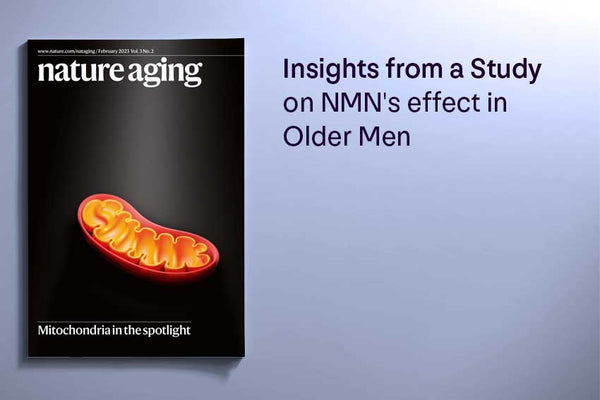
A recent investigation by researchers Masaki Igarashi et al. was published in the medical journal, NPJ Aging, in 2022. The study is focused on the effects of chronic oral supplementation of Nicotinamide Mononucleotide (NMN) on blood Nicotinamide Adenine Dinucleotide (NAD+) levels and muscle function in healthy older men. The study can be found here.
For this study, the researchers provided 250 mg of NMN daily to older aged male participants for durations of 6 or 12 weeks. This was conducted as part of a placebo-controlled, randomized, double-blind, parallel-group trial. The oral supplementation was found to be well tolerated, with no significant harmful effects reported.
Metabolomic analysis of whole blood samples showed a notable elevation of NAD+ and its metabolite concentrations as a result of oral NMN supplementation. Some improvements were noted in gait speed and performance in the left grip test. Still, these changes would need validation in more extensive trials for definitive correlation.
Interestingly, the study did not find any significant impact of NMN on body composition. Thus, despite its ability to elevate NAD+ levels, chronic oral NMN supplementation's effectiveness in combating aging-related muscle dysfunctions would need more research.
The results point to NMN as a potent NAD+ booster, playing a positive role in mitigating aging-related disorders. Although this was explored in preclinical examinations, the human data on this matter remain limited. Thus, further research is required to draw comprehensive conclusions on the large scale effects and advantages of NMN supplementation in healthy older participants.
Key Takeaways
- The study explored the effects of chronic oral supplementation of NMN on blood NAD+ levels and muscle function in older men.
- Participants received a daily dose of 250mg of NMN for periods of 6 or 12 weeks.
- The supplementation demonstrated tolerability and safety, with no significant harmful effects.
- Metabolomic analysis showed increased NAD+ and its metabolite concentrations in participants' blood.
- Enhancements were observed in gait speed and performance in the left grip test, but these results need further validation.
- NMN supplementation did not present significant effects on body composition.
- More extensive human trials are necessary to validate these findings and to explore other potential benefits of NMN supplementation.
